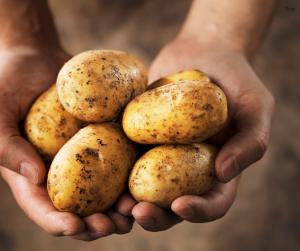By: Judy Davie - The Food Coach
 Potatoes often get a bad rap in the realm of healthy eating. But these humble tubers, with their rich history and undeniable versatility, deserve a closer look. Not only are they an economical staple in many households, but they also pack a nutritional punch that can be a valuable part of a balanced diet. Let's peel back the layers and explore the health benefits, economic advantages, portion control, and circumstances when potatoes might not be your best friend. Potatoes often get a bad rap in the realm of healthy eating. But these humble tubers, with their rich history and undeniable versatility, deserve a closer look. Not only are they an economical staple in many households, but they also pack a nutritional punch that can be a valuable part of a balanced diet. Let's peel back the layers and explore the health benefits, economic advantages, portion control, and circumstances when potatoes might not be your best friend.
The Health Benefits of Potatoes
Potatoes are a rich source of essential vitamins and minerals. A medium-sized potato (about 150 grams) contains:
Vitamin C: Boosts the immune system and acts as a powerful antioxidant.
Vitamin B6: Essential for brain health and energy metabolism.
Potassium: More than a banana, which helps regulate blood pressure.
Fibre: Particularly in the skin, aiding in digestion and promoting gut health.
These nutrients are vital for overall health, making potatoes a valuable addition to your diet. When prepared healthily, such as baked or boiled, potatoes can be a low-calorie, nutrient-dense food.
Economical and Accessible
One of the standout features of potatoes is their affordability. They are one of the most economical vegetables available, making them a crucial component of budget-friendly meal planning. A kilogram of potatoes can serve multiple meals, stretching your dollar while still providing essential nutrients.
Additionally, potatoes have a long shelf life when stored correctly, reducing food waste and ensuring you always have a nutritious option on hand. Their versatility means they can be used in a variety of dishes, from soups and stews to salads and side dishes, making them a kitchen staple.
Portion Size: The Key to Healthy Eating
As with many foods, moderation is key when it comes to potatoes. Portion control can make all the difference in enjoying the health benefits without the downsides. A recommended serving size is about the size of a computer mouse or half a cup of cooked potatoes. This portion provides a good balance of carbohydrates for energy, fibre for digestion, and essential vitamins and minerals.
Pairing potatoes with a variety of vegetables and a source of lean protein can create a well-rounded meal. For instance, a baked potato topped with steamed broccoli and a grilled chicken breast makes for a nutritious and satisfying dinner.
When Are Potatoes Not Good for You?
While potatoes have many health benefits, there are instances when they might not be the best choice:
Fried Potatoes: French fries and chips are often loaded with unhealthy fats and sodium, which can negate the nutritional benefits of the potato itself.
Toppings and Add-ons: Butter, sour cream, and cheese can add excessive calories and saturated fat. Opt for healthier toppings like Greek yoghurt, chives, or salsa.
High Glycaemic Index: Potatoes, particularly when mashed or baked, can cause a rapid spike in blood sugar levels. For those managing diabetes or insulin resistance, moderation and pairing with fibre-rich vegetables and proteins are essential.
Conclusion
Potatoes are a nutritious, economical, and versatile food that, when consumed in appropriate portions and prepared healthily, can be a valuable part of your diet. By understanding their benefits and the best ways to enjoy them, you can dispel the myths and savour the goodness of this often-misunderstood vegetable. So next time you're planning a meal, consider giving the humble potato the spotlight it deserves.
Comments
Be the first to comment!
|